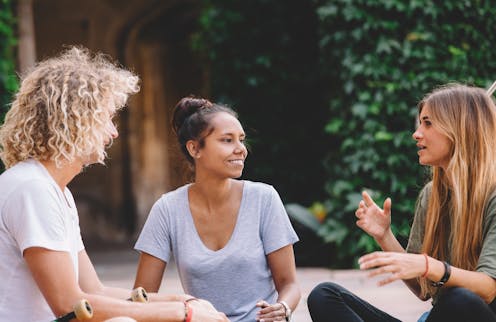How to have informed and respectful conversations about Indigenous issues like the Voice
- Written by Maryanne Macdonald, Lecturer, Indigenous Education, Edith Cowan University

As Australia prepares for the Voice referendum later this year, some commentators struggle to create a respectful space for all sides of politics. Especially to discuss the proposed constitutional change.
Debates with wide-ranging opinions have the potential to distract from the real issues at hand, becoming divisive and harmful. This can lead to spreading[1] misinformation[2] and worsen a lack of understanding across political views.
The way Australia debates the Indigenous Voice to Parliament matters. We saw the 2017 plebiscite on marriage equality, while resulting in a clear “yes” vote, considerably impacted the mental health and wellbeing[3] of LGBTQIA+ people in Australia.
The referendum is a national event, which requires conversations with both Indigenous and non-Indigenous people in Australia. These conversations should bear in mind Indigenous people will be impacted the most by the referendum and the debate around it. Yet, effective national engagement on the Voice also requires non-Indigenous people to see this as important to their lives.
We conducted research[4] examining how to help facilitators make these conversations easier, well-informed and fruitful. This research could be used to inform how the wider public have constructive and sensitive discussions about Indigenous affairs.
Read more: Regional communities were central to Uluru Statement, and they must also be for the Voice to Parliament[5]
What our research found
We work in collaborative teaching spaces where Indigenous and non-Indigenous educators provide space for non-Indigenous students to learn about Australia’s history, Indigenous identities, and future. The students we teach are a diverse group across ages, ethnicities, social backgrounds, and genders.
In our recent publication[6], we explain effective ways for facilitators to engage non-Indigenous people in discussions about Indigenous affairs. We discuss how we created a safe teaching space where students felt they had learned accurate and relevant information, heard Indigenous peoples’ viewpoints and were confident they could work collaboratively with Indigenous people in the future. The findings from our research can easily be applied to discussion around the Voice.
Our study showed these students engaged with Indigenous issues when they had access to:
clear evidence of Australia’s history and public policy as told by Indigenous people, relaying their experiences
examples of successful and respectful collaborations between Indigenous and non-Indigenous people within education
a requirement for participants to consider their own contribution and future engagement with Indigenous peoples and perspectives
space for Indigenous and non-Indigenous people to engage in respectful and informed discussion of issues by establishing ground rules. These rules include knowing appropriate and inappropriate terminology, having a willingness to listen and paying attention to evidence rather than stand-alone stories.
We provided examples of effective collaboration between Indigenous and non-Indigenous people, such as school-community partnerships, health services and environmental management collaborations. We also discussed the approaches that made these collaborations work well. This made most students feel eager and confident to follow these approaches in their future careers.
Most of the students expressed positive attitudes towards Indigenous knowledges and perspectives. However, they also commented that prior to this learning, they had been unaware of how little they knew of Indigenous histories, perspectives, and issues.
These students also had the chance to listen to Indigenous people discuss their experiences and family stories. Many students found they learned a great deal and better understood the depth of ongoing pain from Australia’s racist history. They were then able to think about how this could inform their professional engagement with Indigenous people and themes in schools.
Read more: What can we learn from the marriage equality vote about supporting First Nations people during the Voice debate?[7]
So what could the wider public learn from this?
Indigenous people make up approximately 3% of the population[8] in Australia. So the support of the broader community is vital on Indigenous affairs such as the Voice.
The first step is knowledge. Non-Indigenous people need the opportunity to understand[9] the political journey for Indigenous people in the lead up to the referendum, including the Uluru Statement[10]. This could contextualise the importance of addressing longstanding injustices and help create better futures for Indigenous peoples.
Secondly, people need to understand how this referendum will affect Indigenous and non-Indigenous people. We can turn to the words of the many Indigenous voices who have made their thoughts a matter of public record[11].
Thirdly, safe space for respectful and informed dialogue is essential. The threat[12] of being labelled “racist” can shut down meaningful discussion and prevent non-Indigenous engagement[13] on important issues. But at the same time, Indigenous people having to manage fragility in non-Indigenous people can be exhausting[14].
Indigenous people need to be able to express their own positions on the Voice in a space that enables constructive dialogue, regardless of which political side they are on. Again, this requires that listeners understand the histories, and contemporary realities, at the heart of the Uluru Statement. It also means recognising that within any group of people, there will always be diverse perspectives on political matters.
Discussion spaces need to be informed by Indigenous peoples’ perspectives and knowledge about the realities which have brought us to this referendum. They should allow all people in Australia the opportunity to consider the part they will play in the future of our nation.
References
- ^ spreading (www.brookings.edu)
- ^ misinformation (theconversation.com)
- ^ mental health and wellbeing (theconversation.com)
- ^ research (journals.sagepub.com)
- ^ Regional communities were central to Uluru Statement, and they must also be for the Voice to Parliament (theconversation.com)
- ^ publication (journals.sagepub.com)
- ^ What can we learn from the marriage equality vote about supporting First Nations people during the Voice debate? (theconversation.com)
- ^ 3% of the population (www.abs.gov.au)
- ^ understand (voice.gov.au)
- ^ Uluru Statement (fromtheheart.com.au)
- ^ a matter of public record (www.aph.gov.au)
- ^ threat (onlinelibrary.wiley.com)
- ^ prevent non-Indigenous engagement (www.tandfonline.com)
- ^ exhausting (www.theguardian.com)

















